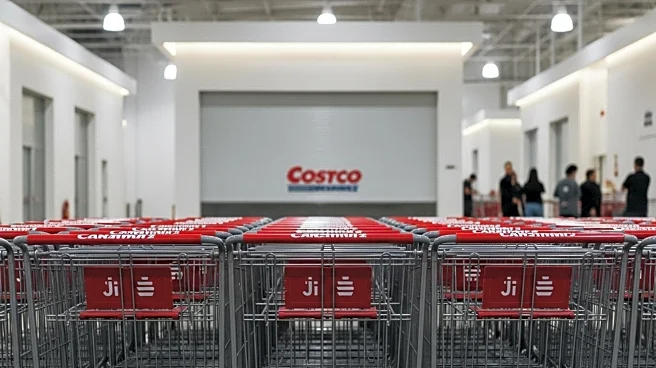What is the story about?
What's Happening?
Costco has introduced a new tiered membership system that offers exclusive shopping hours to its executive members, who pay $130 annually compared to the $65 base tier. This move is part of a broader trend in various industries, including retail, travel, and entertainment, where companies are increasingly stratifying customers to maximize revenue. By offering special perks to higher-paying members, Costco aims to attract more customers to its premium tier, thereby increasing its revenue. This strategy mirrors practices in other sectors, such as airlines, where services are unbundled and offered at different price points to cater to varying consumer willingness to pay.
Why It's Important?
The introduction of tiered membership hours at Costco highlights a significant shift in consumer pricing strategies across industries. This approach, known as perfect price discrimination, allows companies to extract maximum revenue from each customer by offering differentiated services at varying price points. While this can benefit consumers who opt for premium services, it also raises concerns about increasing economic inequality and the potential for businesses to exploit consumer data to set personalized prices. As companies continue to adopt these strategies, consumers may face more complex pricing structures, potentially leading to a more segmented market where access to certain services is increasingly determined by one's ability to pay.
What's Next?
As Costco and other companies continue to explore tiered pricing models, consumers can expect further segmentation in service offerings. This may lead to increased competition among businesses to offer more attractive perks to higher-paying customers, potentially driving innovation in customer service and product offerings. However, it may also prompt regulatory scrutiny over pricing practices and data usage, as concerns about consumer privacy and fairness in pricing grow. Companies will need to balance the benefits of revenue maximization with the risk of alienating customers who feel disadvantaged by these stratified systems.
Beyond the Headlines
The trend towards consumer stratification raises ethical questions about the fairness of pricing strategies that disproportionately benefit wealthier consumers. As businesses leverage data analytics to tailor pricing and services, there is a risk of exacerbating social inequalities and creating a 'caste system' in consumer markets. This shift also reflects broader economic changes, as companies move away from cost-plus pricing to value-based pricing, where perceived value rather than production cost determines price. This evolution in pricing strategy may have long-term implications for consumer behavior and market dynamics.
















